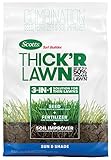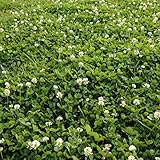The sweet clover is an annual legume with a deep taproot that can grow up to 3 feet in height. The plant creates nitrogen-fixing nodules on its root nodules by symbiosis with Rhizobium bacteria. Clover can be grown as a cover crop, for livestock feed, or as fodder grasses. It is commonly used in home gardens for soil improvement. Clover is not usually grown for hay because it has a lower yield than other grasses.
There are many different types of fertilizers for clover. One of the best fertilizers for clover is the Daconil Fungicide, which is a fungicide that kills fungus on plants. You can also see our best Fertilizer for Clover.
Contents
The 10 best fertilizers for clover in 2023
To grow the healthiest and most vibrant clover in your garden, there are a few fertilizers that work great. Without fertilizers, clover will not be able to thrive and will produce small blooms. The type of fertilizer you use when planting clover is important because different fertilizers can affect when or if your plant flowers.

WZQH Leather Work Gloves for...

Concentrated Surfactant for...

Crimson Clover Seeds for...

Zenport GA401 Dibber for...

Scotts Turf Builder Weed &...

Southern Ag Surfactant for...

Scotts Turf Builder THICK'R...

Ortho WeedClear Lawn Weed...

Outsidepride 5 lb. Perennial...

Ortho WeedClear Weed Killer...
What is the best fertilizer for clover?
Many people use clover as a cover crop in the garden to prevent weeds and enrich soil. Clover is easy to grow, but should be fertilized to promote growth. While there are many different fertilizers available, organic fertilizers should be used if possible. There are many benefits of using an organic fertilizer instead of an inorganic one.Many people grow clover as a cover crop in their gardens to prevent weed growth and enrich soil.
The best fertilizer for clover is a neutral or alkaline fertilizer, such as lime or wood ashes. When using the ashes of wood, you can use them in soil at a rate of 1 pound per 100 square feet and leave the mixture in the ground for two months to break down before planting.
Amount of fertilizer to use for clover
In order to have a successful clover crop, the amount of fertilizer used is important. In most cases, an application of nitrogen at 200 pounds per acre is sufficient, with a spreader set for 5-10 pounds per acre. This level of fertilizer should be applied in mid-February and again in late May. Low nitrogen levels will lead to low clover yields and can cause some plants to die before they produce seeds or blooms.
FAQs on best fertilizer for clover
Q1: What is the best fertilizer for clover?
A: Clover is a plant that is native to North America. It can be found in fields and pastures in the United States and Canada. Clover is one of the most nutritious plants on earth.
Q2: How do I use clover as fertilizer?
A: Clover is best used as a mulch or a cover crop. You can grow clover by using a three-inch layer of clover mulch or you can plant it with a cover crop. Clover grows best in sandy, loamy soil, but it will grow in almost any soil.
Q3: What kind of clover should I grow?
A: Clover can be grown in almost any area of the country, including the mountains. There are many varieties of clover, including alsike, red, and white clover. The best type of clover for your soil depends on what you want to grow.
Q4: How do I know if my clover is healthy?
A: You can use a clover tester to check for diseases. If you find any problems, you can treat it.
Q5: What is the best time to plant clover?
A: You can plant clover anytime during the spring and summer. But, planting in the fall or winter will cause the seeds to germinate the following spring.
Q6: How do I know if my clover has been planted?
A: Clover will grow about three inches a week, so you’ll know if it’s been planted when the leaves start to grow.
Q7: What is the best time to fertilize clover?
A: You should fertilize your clover every two weeks during the growing season. Fertilizing clover helps it grow faster and makes it more nutritious.
Q8: What are the benefits of clover?
A: Clover is very nutritious for both animals and humans. It’s high in protein and calcium, and it contains B vitamins.
Conclusion
The best fertilizer for clover is a 3-4-2 formula. It contains nitrogen, potassium, and phosphorous which are the three main ingredients for this plant. This mix of nitrogen, potassium, and phosphorous all give your clover a natural look and glow. You must fertilize your clover every four weeks to maintain a healthy flow of nutrient-rich food throughout the plant.
